District Of Columbia Documents
Quitclaim Deed
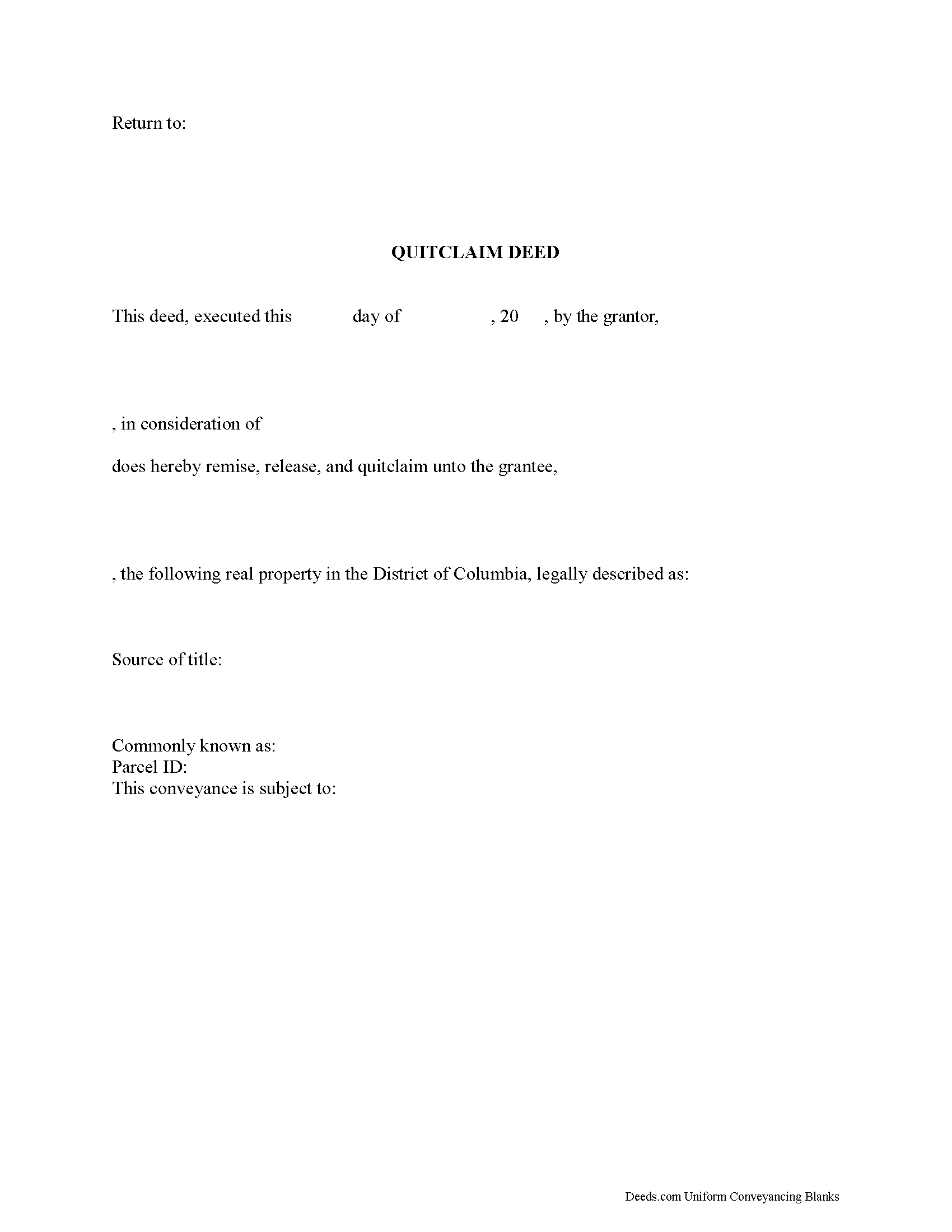
Statutory Requirements for Quitclaim Deed Forms in the District Of Columbia.
Content:
DC ST 42-601 provides a form for a generic grant deed. It also allows for modifications to the statutory form so that the deed can clearly represent the grantor's intentions. By giving the form an appropriate title, in this case, "Quitclaim Deed," and replacing the word "grant" with "quitclaim," any implied warranties are nullified. This statute also directs the minimum requirements to execute a quit claim deed. Include the date the deed is executed (signed by the grantor); the names and addresses of all grantors and grantees who are party to the transfer of ownership; the consideration paid for the property (usually money); the legal description of the property; the grantor's signature; and an acknowledgement by a notary or other official authorized to administer oaths. Also, any instrument conveying property ownership must be in writing (DC ST 42-1017).
Recording:
Washington, DC follows a "race-notice" recording statute as defined within DC ST 42-401. Any deed changing the ownership status of real property in the District, executed, acknowledged and certified as provided in 42-101, ... More Information about the District Of Columbia Quitclaim Deed
Gift Deed
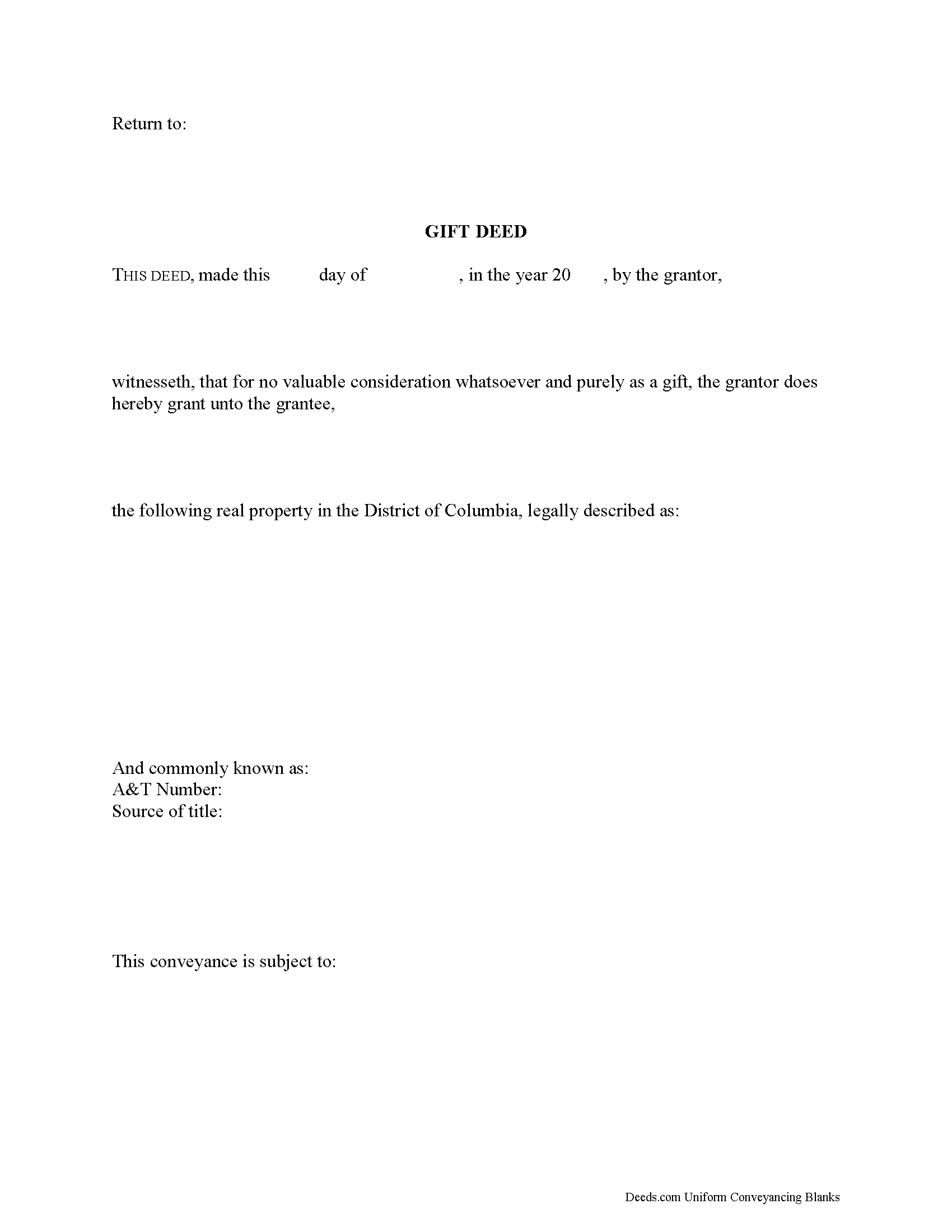
Gifts of Real Property in the District of Columbia
Gift deeds convey title to real property from one party to another with no exchange of consideration, monetary or otherwise. Often used to transfer property between family members or to gift property as a charitable act or donation, these conveyances occur during the grantor's lifetime. Gift deeds must contain language that explicitly states that no consideration is expected or required. Ambiguous language, or references to any type of consideration, can make the gift deed contestable in court.
A lawful gift deed includes the grantor's full name and marital status, as well as the grantee's full name, marital status, vesting, and mailing address. Vesting describes how the grantee holds title to the property. Generally, real property is owned in either sole ownership or co-ownership. For District of Columbia residential property, the primary methods for holding title are tenancy in common, joint tenancy, and tenancy by the entirety. An estate conveyed to two or more people is presumed a tenancy in common, unless otherwise specified (D.C. Code 42-516).
As with any conveyance of realty, a gift deed requires a complete legal ... More Information about the District Of Columbia Gift Deed
Fee Simple Deed
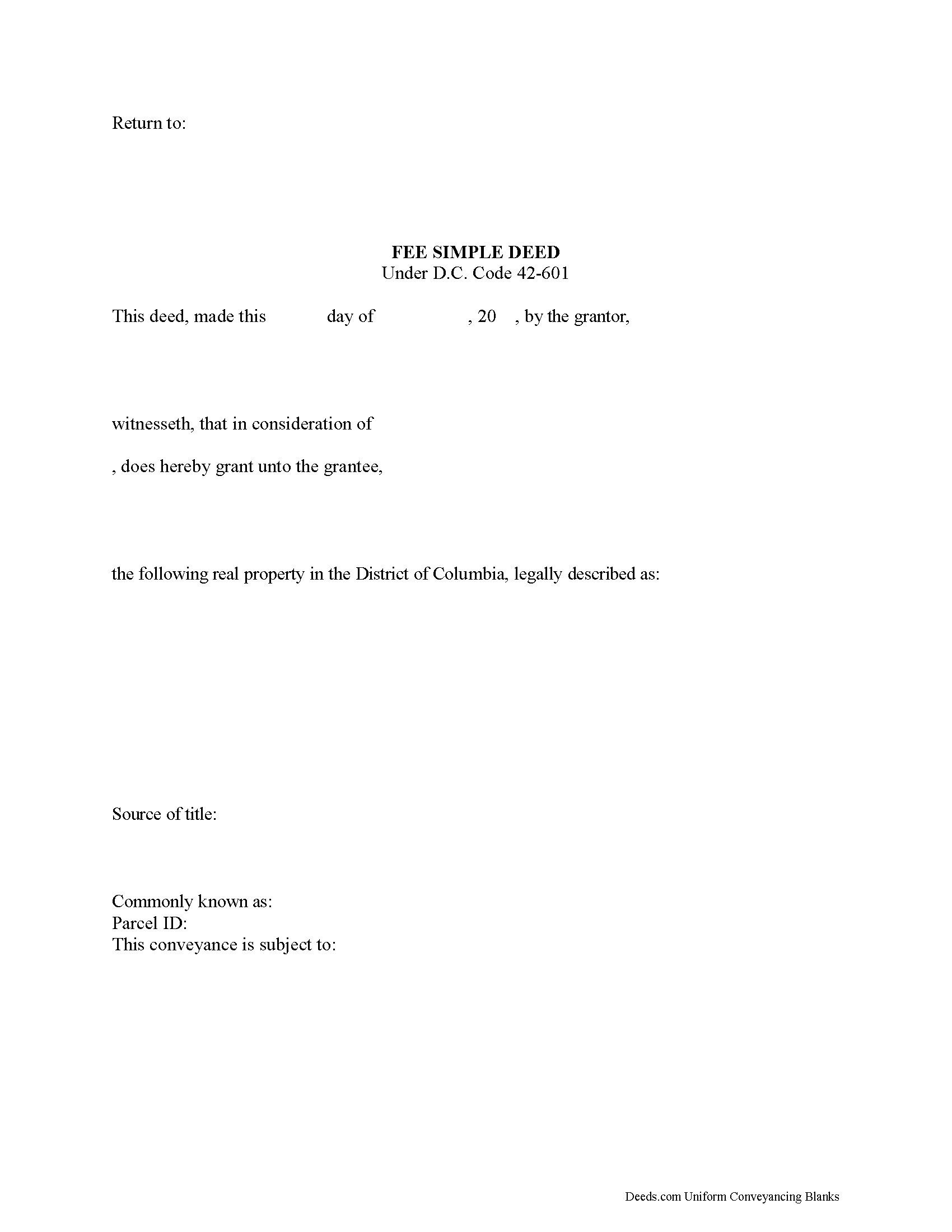
Using a Fee Simple Deed in Washington, DC
Use this deed to convey property from grantor to grantee and to establish ownership in perpetuity.
In Washington, D.C., "every conveyance or devise of real estate shall be construed and held to pass a fee simple estate or other entire estate of the grantor or testator, unless a contrary intention shall appear by express terms or be necessarily implied therein" (D.C. Code 42-701). The fee simple deed is used to convey property from one person to another.
According to Black's Law Dictionary (8th ed.), a fee simple deed creates the broadest property interest allowed by U.S. law. Property owned in fee simple is owned in perpetuity, until the current holder of the property dies without heirs. A property held in fee simple does not have to include words of inheritance to differentiate it from a life estate; in the event of death, a fee simple property passes to any and all heirs, unless otherwise stated in the form of the deed.
There are two types of fee simple ownership under D.C. Code 42-503: absolute and qualified. A property in fee simple absolute allows the holder the unconditional power to use, sell, lease, or will the property ... More Information about the District Of Columbia Fee Simple Deed
Warranty Deed
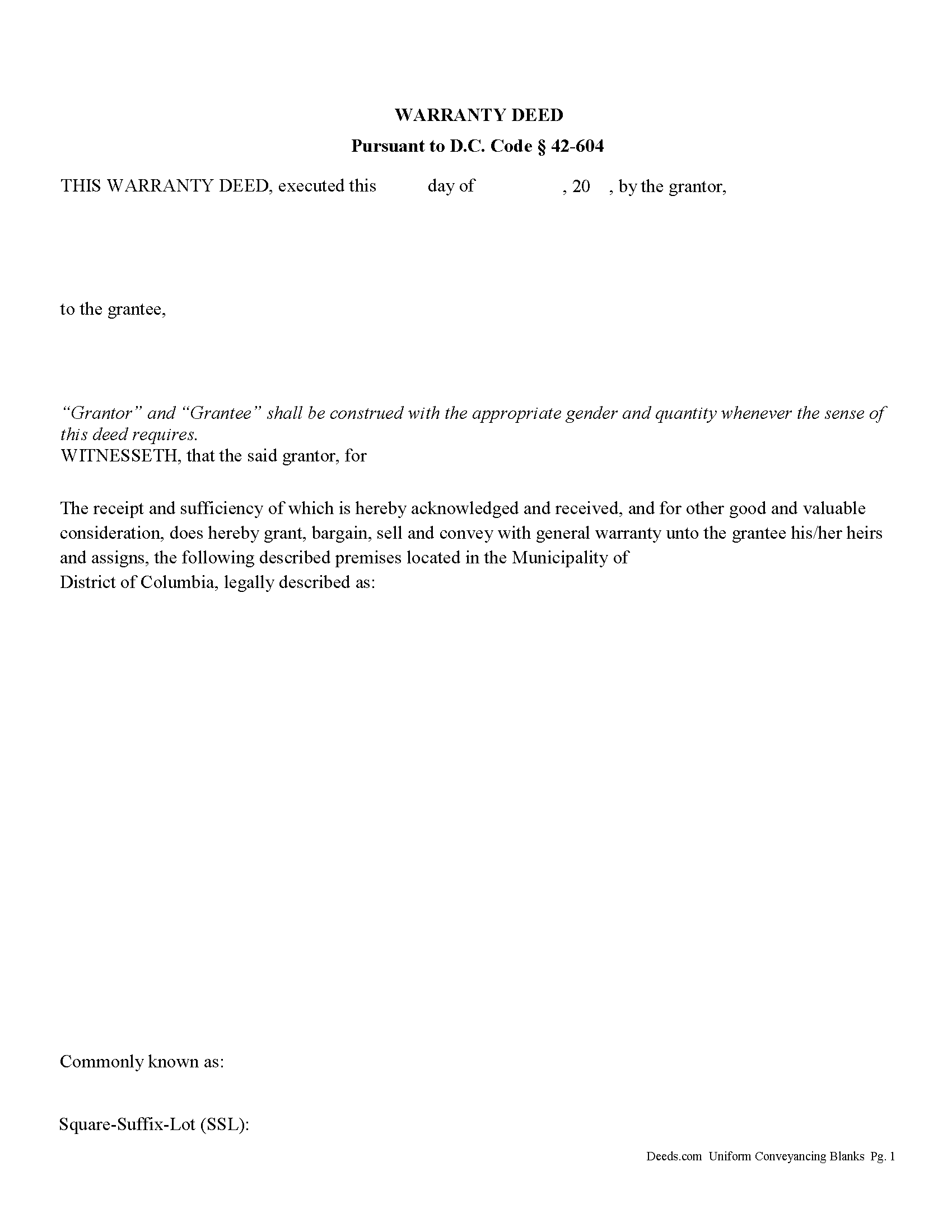
Any interest in or claim to real estate in the District of Columbia, whether for present or future possession and enjoyment, and whether vested or contingent, may be disposed of or created by a deed or will in writing ( 42-301). The statutory forms for conveyances of real property, as presented in 42-601 of the District of Columbia Code, are sufficient for their respective purposes. Any covenant, restriction, limitation, or provision allowed by law can be added, attached to, or introduced in the forms provided. Additionally, any other form conforming to the rules presented in the statutes will be sufficient for a conveyance of real property.
A covenant in a Washington, D.C. general warranty deed by the grantor "that he will warrant generally the property hereby conveyed" or a grant of real estate in which the granting words are followed by the words "with general warranty" will have the same effect as if the grantor had covenanted that he, his heirs, devisees, and personal representatives will warrant and defend the said property unto the grantee, his heirs, devisees, personal representatives, and assigns against the claims and demands of all persons ( 42-604).
If a warrant... More Information about the District Of Columbia Warranty Deed
Special Warranty Deed
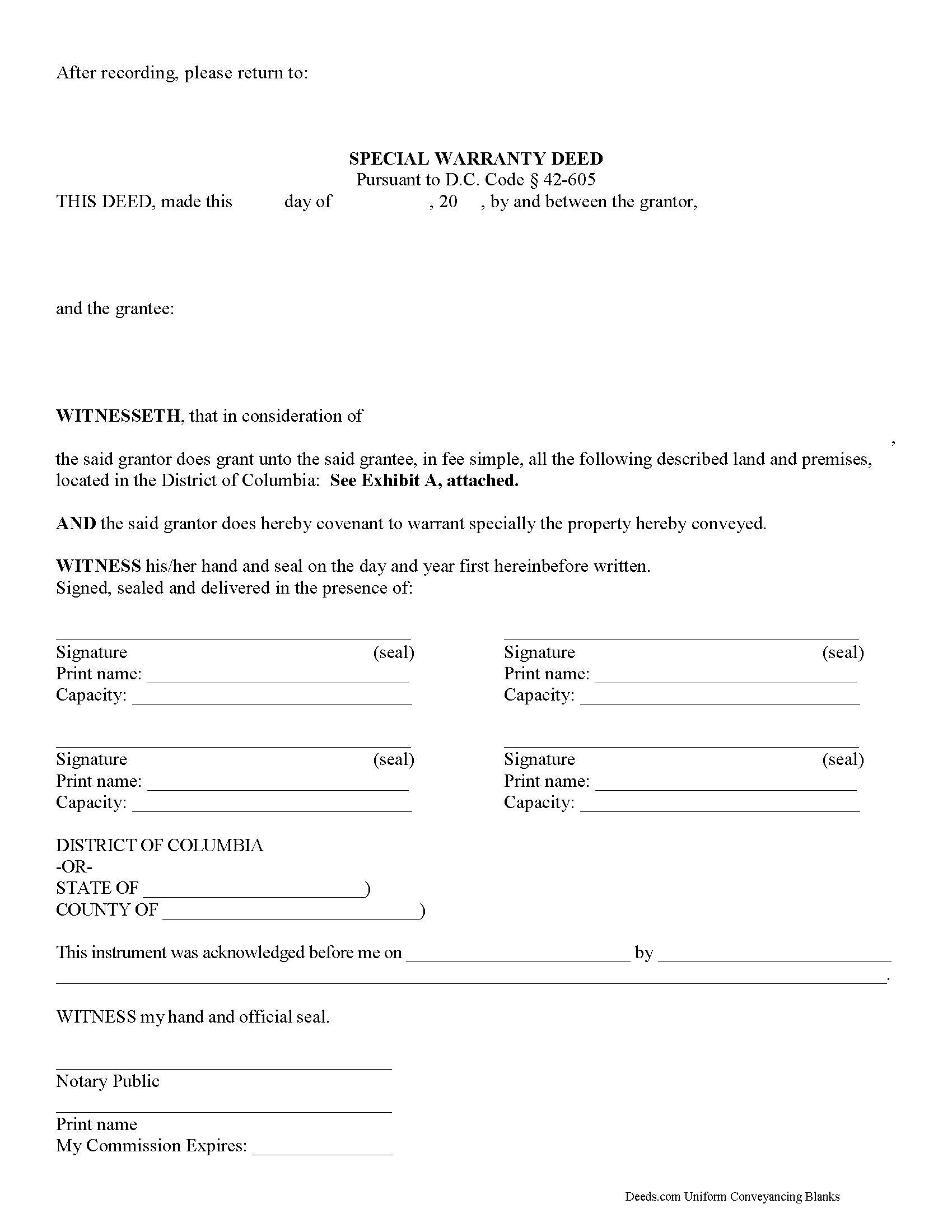
A special warranty deed can be used to convey title to real property in Washington, D.C. The real estate deed must meet the requirements of the D.C. Code of Laws.
A covenant by a grantor in a deed that he will "warrant specially the property hereby conveyed" or the use of the words "special warranty" will have the same effect as if the grantor had covenanted that he, his heirs, and personal representatives will forever warrant and defend the said real property unto the grantee, his heirs, personal representatives, and assigns against the claims and demands of the grantor and all persons claiming or to claim by, through, or under the grantor ( 42-605). A special warranty deed will also contain a covenant against encumbrances.
In order to be considered recordable, a special warranty deed has to be properly executed or acknowledged ( 42-407). The grantor must sign and acknowledge a special warranty deed before presenting it to the recorder of deeds. A notarial act is defined as taking an acknowledgment, administering an oath or affirmation, taking verification upon oath or administration witnessing or attesting a signature, or any other similar act authorized by law ( 42-141). ... More Information about the District Of Columbia Special Warranty Deed
Grant Deed
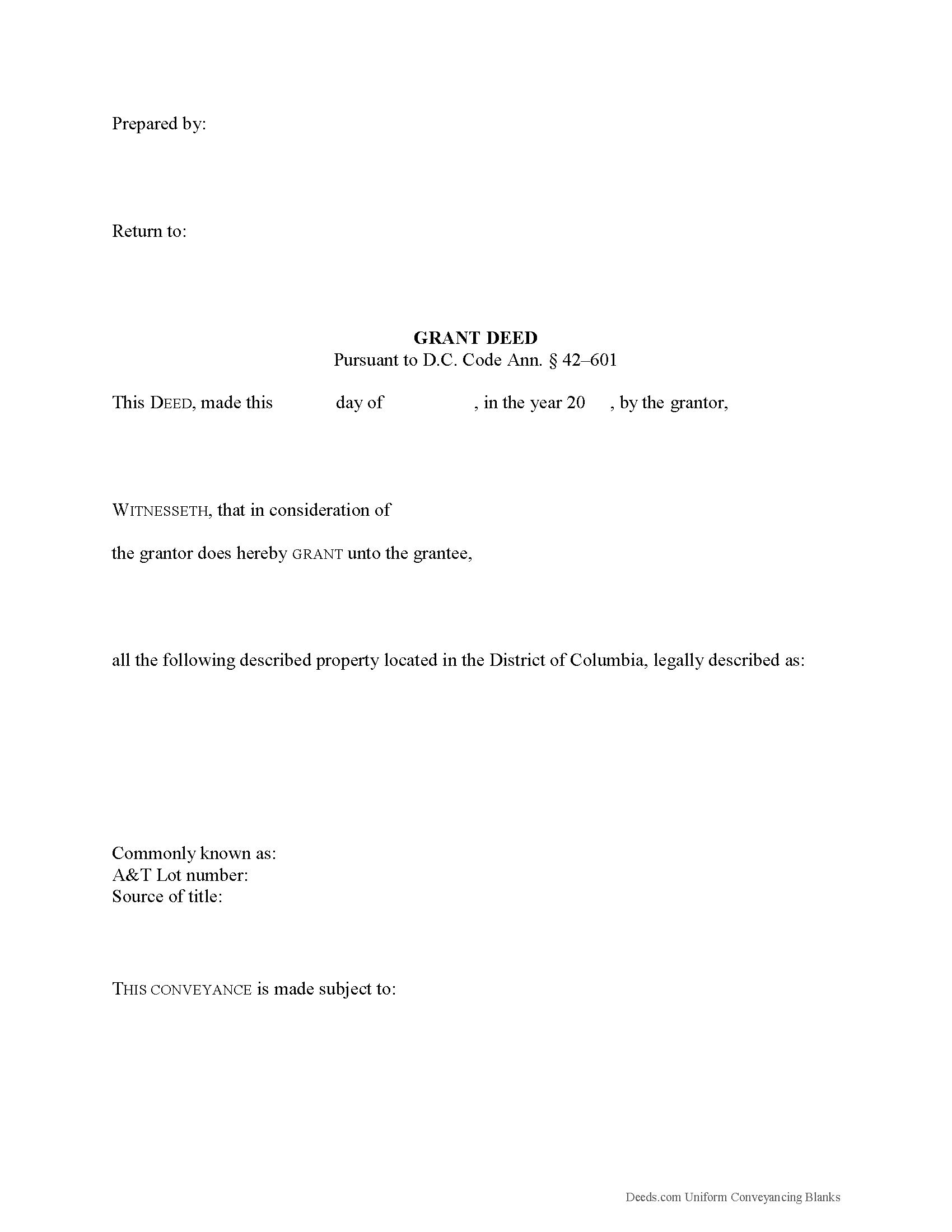
Through the use of a deed or will in writing, a grantor may create or dispose of any interest in or claim to real estate in the District of Columbia, whether it is for present or future possession and enjoyment, and whether it is vested or contingent ( 42-301). The District of Columbia Code, 42-601, provides statutory forms for conveyances of real property, which are sufficient for their respective purposes. Any covenant, restriction, limitation, or provision allowed by law can be added, attached to, or introduced in the forms provided. Other forms conforming to the statutory rules will be sufficient for a conveyance of real property in the District.
A grant deed contains some of the usual covenants of title, but does not offer as much protection as a warranty deed. In a grant deed, the grantor warrants that he has not previously conveyed the estate being granted, has not encumbered the property except as may be stated in the deed, and will convey after-acquired title, unless the deed states otherwise.
Upon presenting a grant deed to the Recorder of Deeds for recordation, the grantor must sign the deed and have his or her signature acknowledged by an officer who is authoriz... More Information about the District Of Columbia Grant Deed
Correction Deed

Use the correction deed to amend an error in a previously recorded deed of conveyance, such as a warranty or quitclaim deed, in the District of Columbia.
Correcting a deed helps to prevent title flaws, which may cause problems when the current owner attempts to sell the property. In D.C., errors in a previously recorded deed can be corrected by a means of a re-recording certificate or by preparing and recording a new correction deed, which does not convey title but confirm the prior conveyance.
The D.C. recorder's office provides a form, titled Re-Recording Certificate, on its site. It is a one-page form, on which the relevant information must be re-entered: the party requesting the re-recording (section I), the property description (section II), and all party names (section III). The reason for requesting a re-recordation must be given in section IV.
In addition, the relevant and corrected pages must be attached to the re-recording form. Make sure to copy the entire deed prior to making any corrections on it since section V requires that it be submitted as well. In the final certification section (VI), the re-recording certificate must be signed in the presence of a no... More Information about the District Of Columbia Correction Deed
Easement Deed
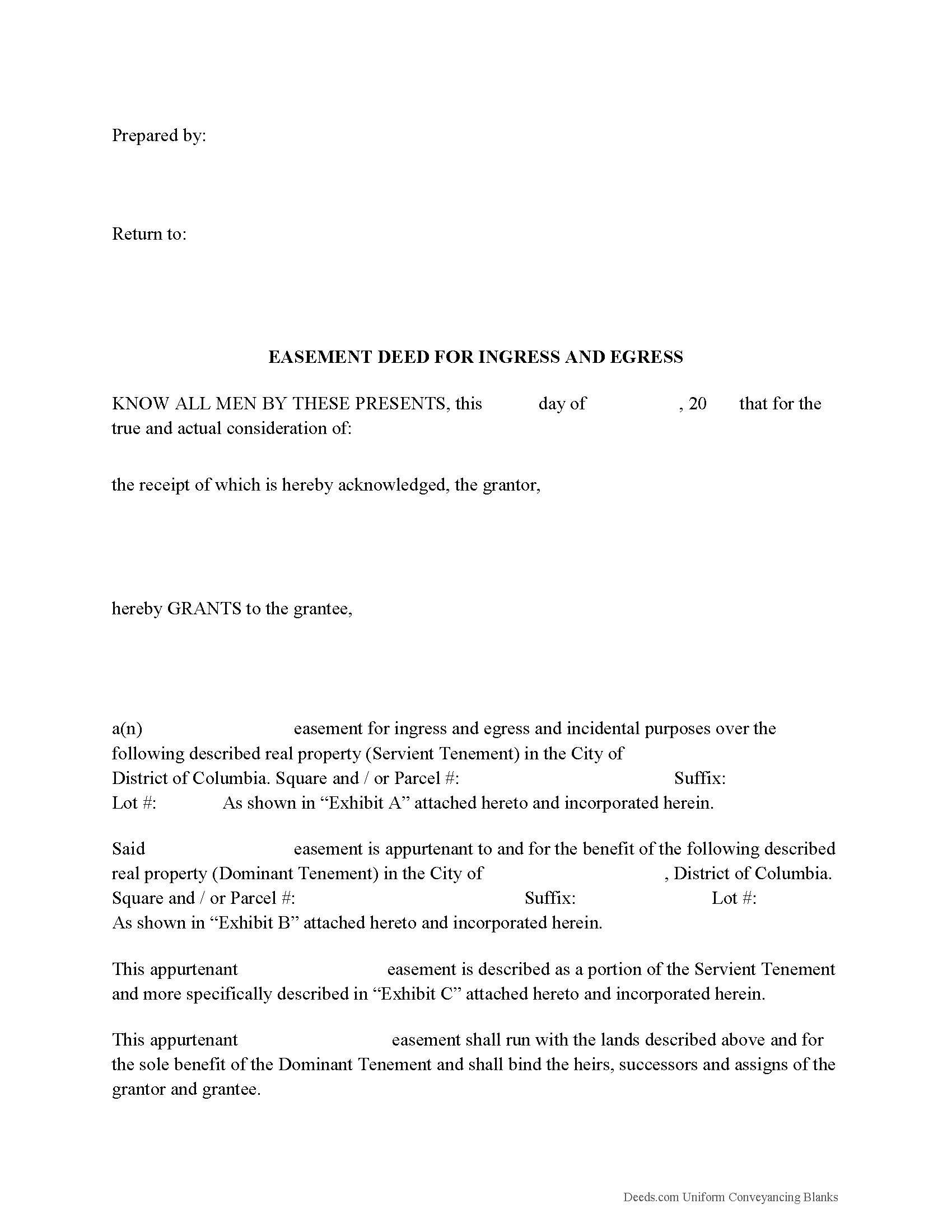
An easement is a non-possessory right to use another person's property and is typically granted for a very specific or limited purpose. Many different types of easements are used in D.C.: utility easements, right-of-ways, common driveway easements, conservation easements, and so on. The most common way of creating an easement in the District of Columbia is by a deed or contract in writing, which is known as an express easement; however, implied easements are also used frequently. An easement can also be established by prescription, which requires a claimant to demonstrate that their use of the landowner's property was open, notorious, exclusive, and adverse, and that his use of the property continued for fifteen consecutive years. There are two classifications of easements: affirmative or negative easements.
A D.C. conservation easement is a non-possessory interest of a holder in real property imposing limitations or affirmative obligations, for the purpose of retaining or protecting the natural, scenic, or open-space values of real property (42-201). A conservation easement is created, conveyed, and recorded in the same manner as other easements, but is exempt from recordation... More Information about the District Of Columbia Easement Deed
Termination, Cancellation of Easement / Right of Way
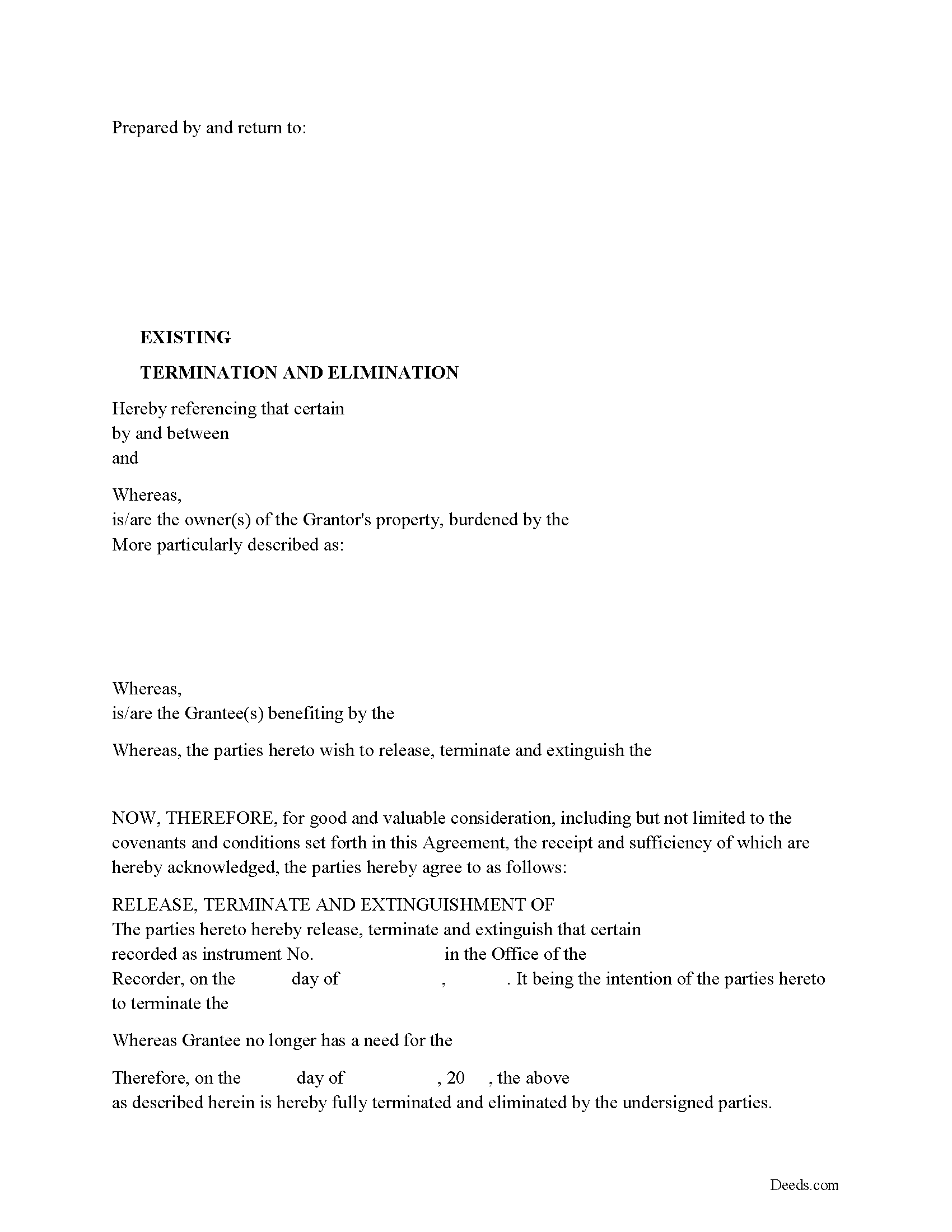
Use this form to release, terminate, extinguish a previously recorded document that involves access to and from a property.
Documents such as:
1. Easement Deeds or Agreements (An easement is a non-possessory interest in land, granting the right to use someone else's property for a specific purpose, like a driveway or utility line)
2. Access Roads
3. Right of Ways
4. Utility Easements (Power, Gas, Water, Sewer, Etc.)
5. Drainage Easements
This document allows the owner of the land, burdened by the access and the party that benefits from the access, to sign an agreement releasing the property from such access, ... More Information about the District Of Columbia Termination, Cancellation of Easement / Right of Way
Transfer on Death Deed
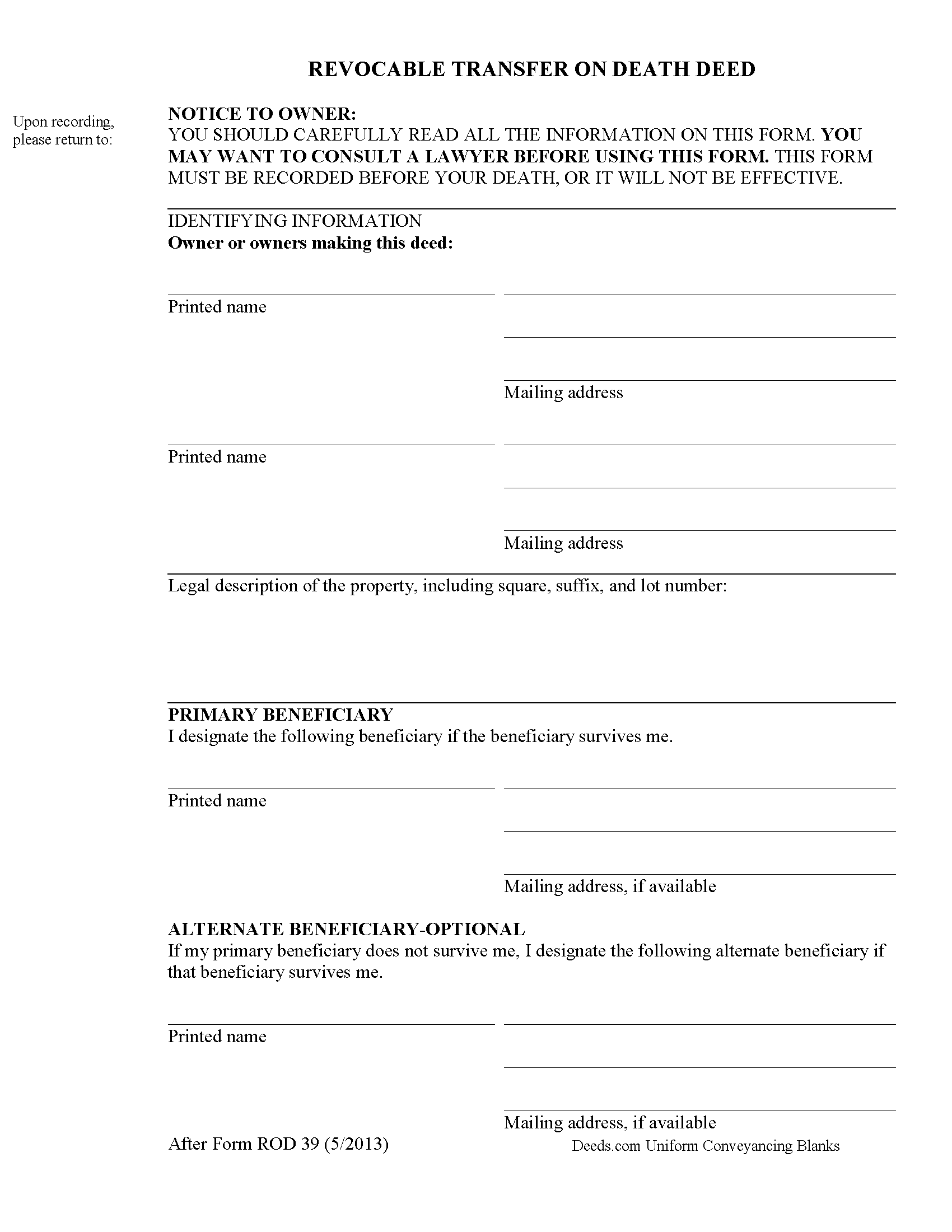
Owners of real property in the District of Columbia now have access to a useful estate planning tool: the transfer on death deed (TODD). Modeled after the Uniform Real Property Transfer on Death Act and located at D.C. Code 19-604.01 et seq (2013), this statute governs the use of transfer on death deeds in the District of Columbia.
Transfer on death deeds are nontestamentary (not using a will) instruments that allow transferors/owners to retain absolute ownership of and control over their land during their lives ( 19-604.07). Because they deal with after-death assets, however, their execution requires the same level of competency as a will ( 19-604.08). The owners may sell, mortgage, rent, or otherwise use the real estate however they choose, with no penalty for waste or obligation to notify the beneficiaries ( 19-604.12).
By recording the executed TODD, property owners may also take advantage of one of the most unique aspects of these instruments: revocability ( 19-604.06). Revocability is possible for two primary reasons: there is no obligation to notify the beneficiaries about the potential future interest they stand to gain when the owner dies; and these conveyances ge... More Information about the District Of Columbia Transfer on Death Deed
Transfer on Death Revocation
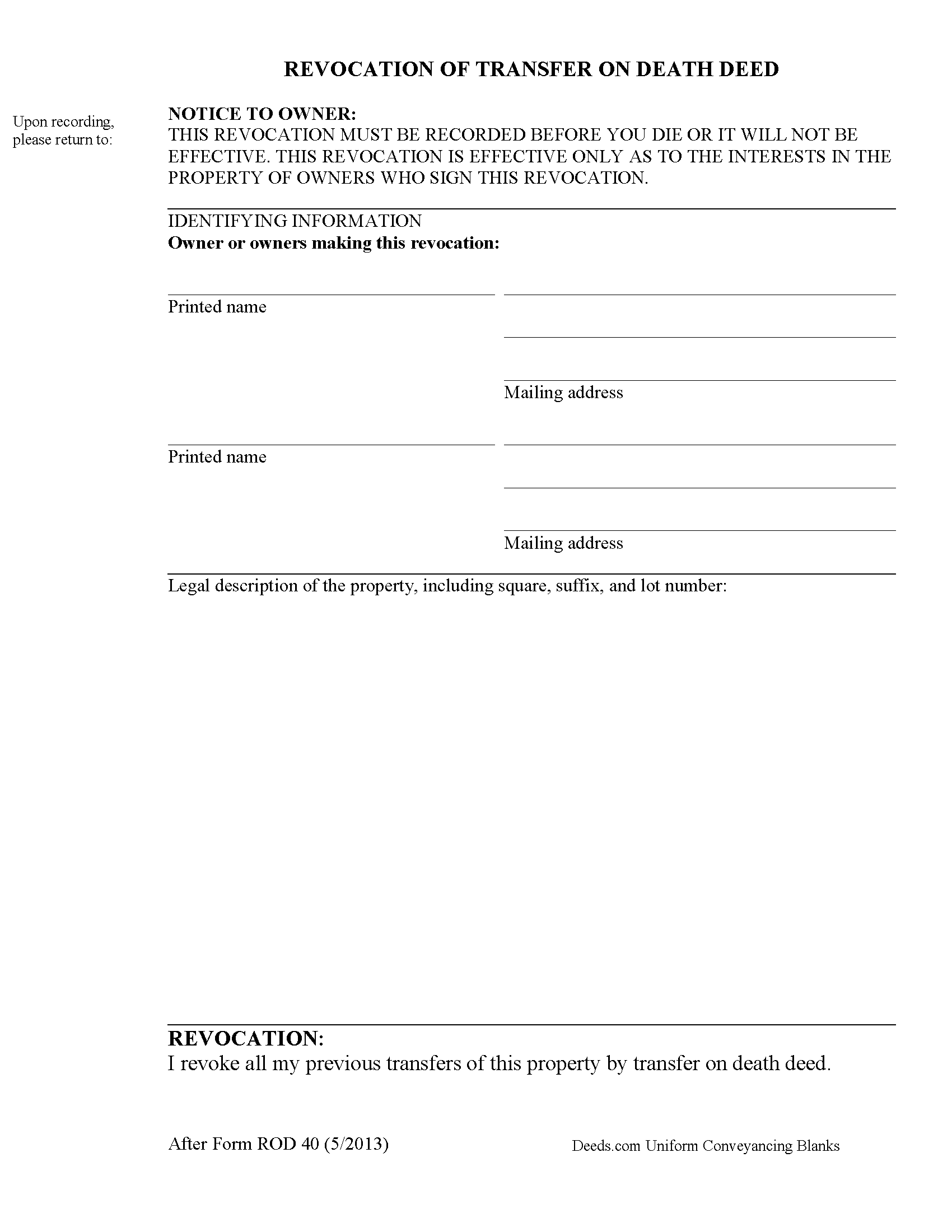
Revoking a Transfer on Death Deed in the District of Columbia
On March 19, 2013, owners of real property in Washington, DC, gained access to a useful estate planning tool: the transfer on death deed (TODD). Modeled after the Uniform Real Property Transfer on Death Act (URPTODA) and located at D.C. Code 19-604.01 et seq (2013), this statute governs the use of transfer on death deeds in the District of Columbia.
Because life's circumstances can change quickly, it's important to establish an estate plan and to keep it up-to-date. Transfer on death deeds deal with the disposition of what is often one of people's largest assets, their real estate. Most real estate deeds involve permanent, and frequently immediate, transfers of ownership from the old owner to the new one. What makes TODDs so unique is the option to revoke them ( 19-604.06).
Using the rules set forth in 19-604.11, property owners who previously recorded a TODD may revoke, change, or otherwise modify their earlier plans with no penalty. There are three basic methods for revocation: executing and recording (1) a new TODD that revokes all or part of the recorded TODD; (2) an "instrument of revocation that expres... More Information about the District Of Columbia Transfer on Death Revocation
Personal Representatives Deed of Sale
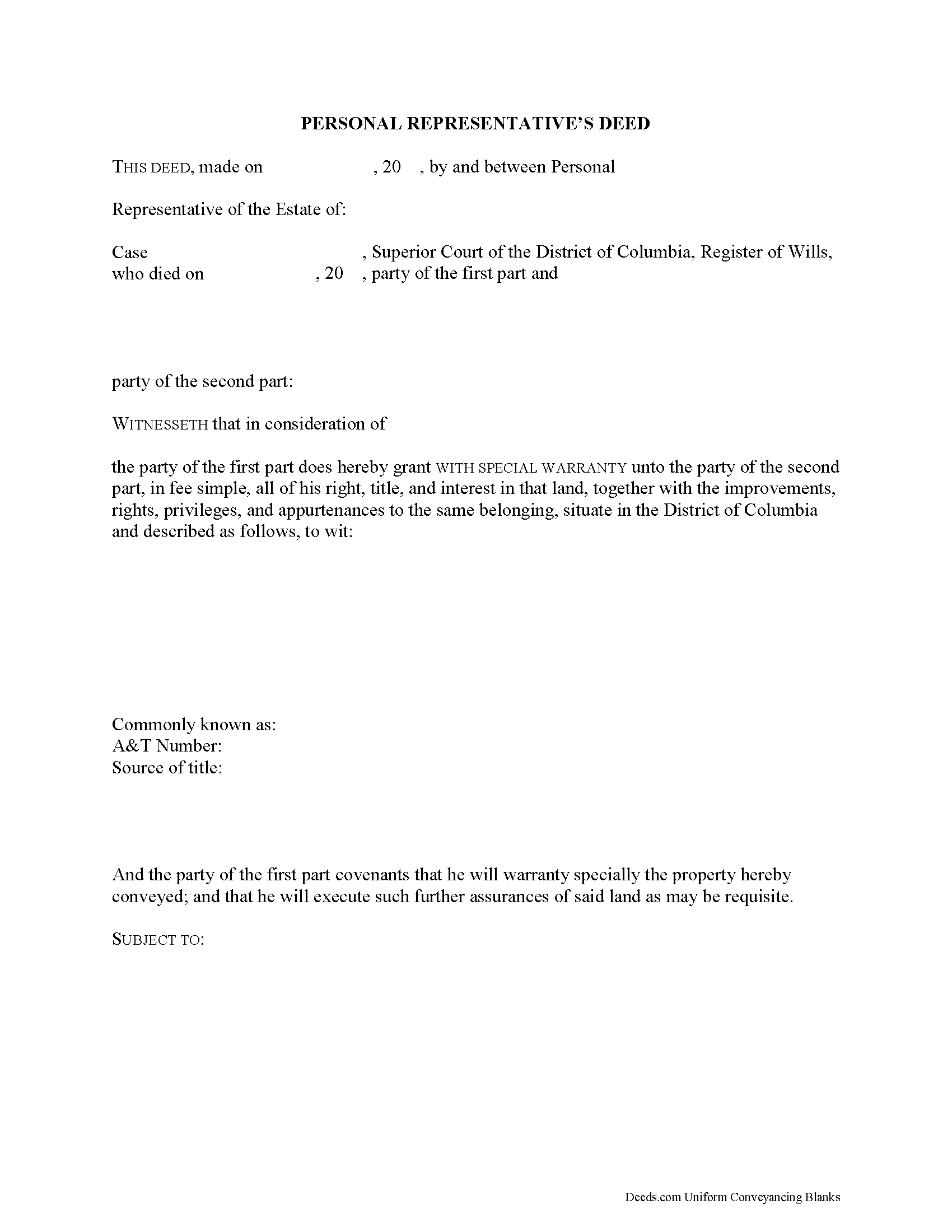
In Washington, DC, the person who oversees the administration of a decedent's estate is called a personal representative. Among a personal representative's duties may be selling a decedent's real property to pay the estate's debts or to equally divide proceeds among heirs.
Use a personal representative's deed of sale to convey title to real property to a purchaser pursuant to the terms of a decedent's will or court order following petition. The deed conveys title with special warranty, covenanting that the personal representative has maintained the title in the same status as when the decedent died.
Consult an attorney with questions about using a personal representative's deed of sale, or any other issues related to probate in Washington, DC.
District of Columbia Personal Representative's Deed of Sale... More Information about the District Of Columbia Personal Representatives Deed of Sale
Personal Representative Deed of Distribution
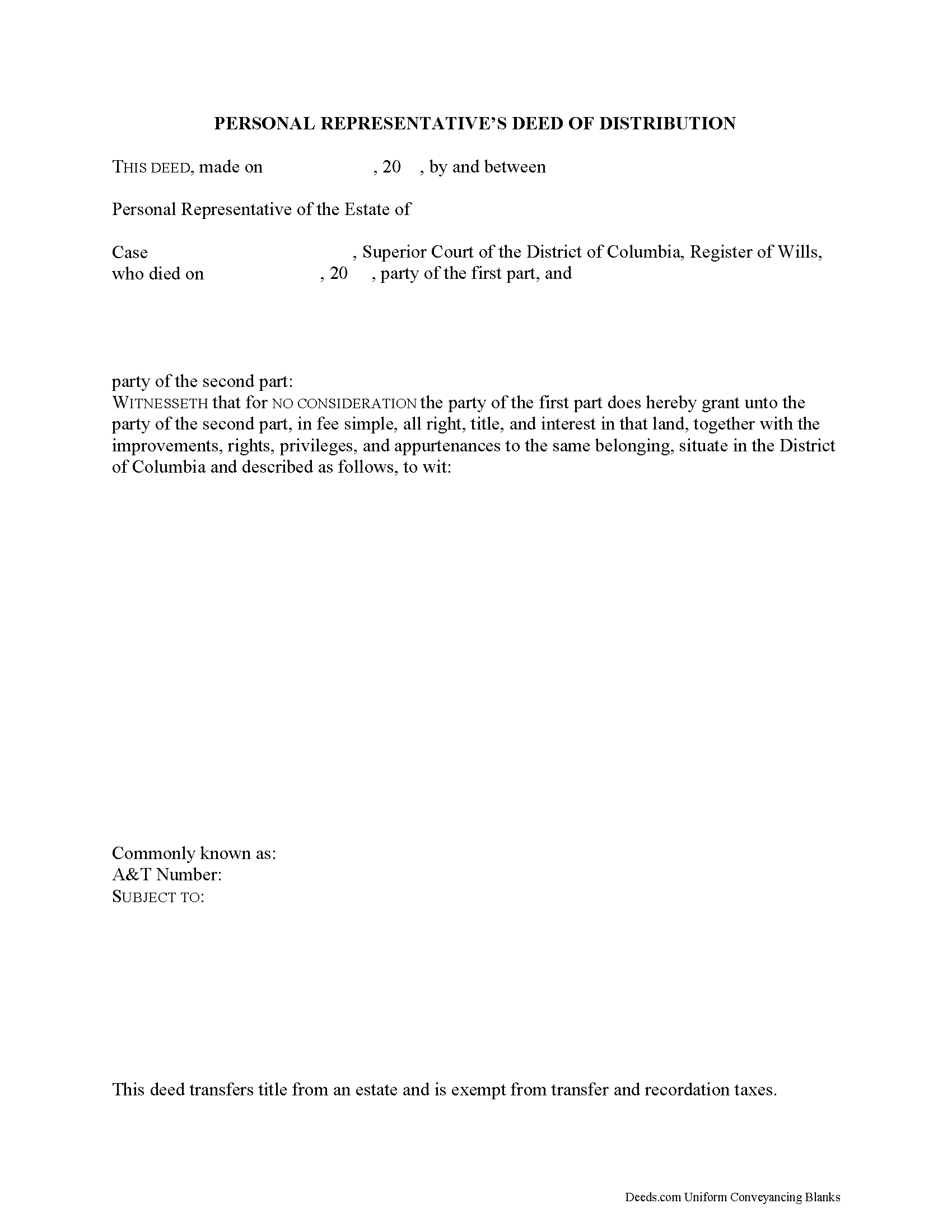
In Washington, DC, the person who oversees the administration of a decedent's estate is called a personal representative. Among a personal representative's duties is transferring the decedent's property to his or her rightful heirs.
Use a personal representative's deed of distribution to convey probate real property to legatee (person to receive property under the terms of a will) or heir (person to inherit property pursuant to laws of intestacy when the decedent dies without a will). The deed conveys title without warranty, but may be customized to fit the grantor's needs.
Consult a lawyer with questions about using a personal representative's deed or any other issue related to probate in Washington, DC.
District of Columbia Personal Representative's Deed of Distribution... More Information about the District Of Columbia Personal Representative Deed of Distribution
Trustee Deed
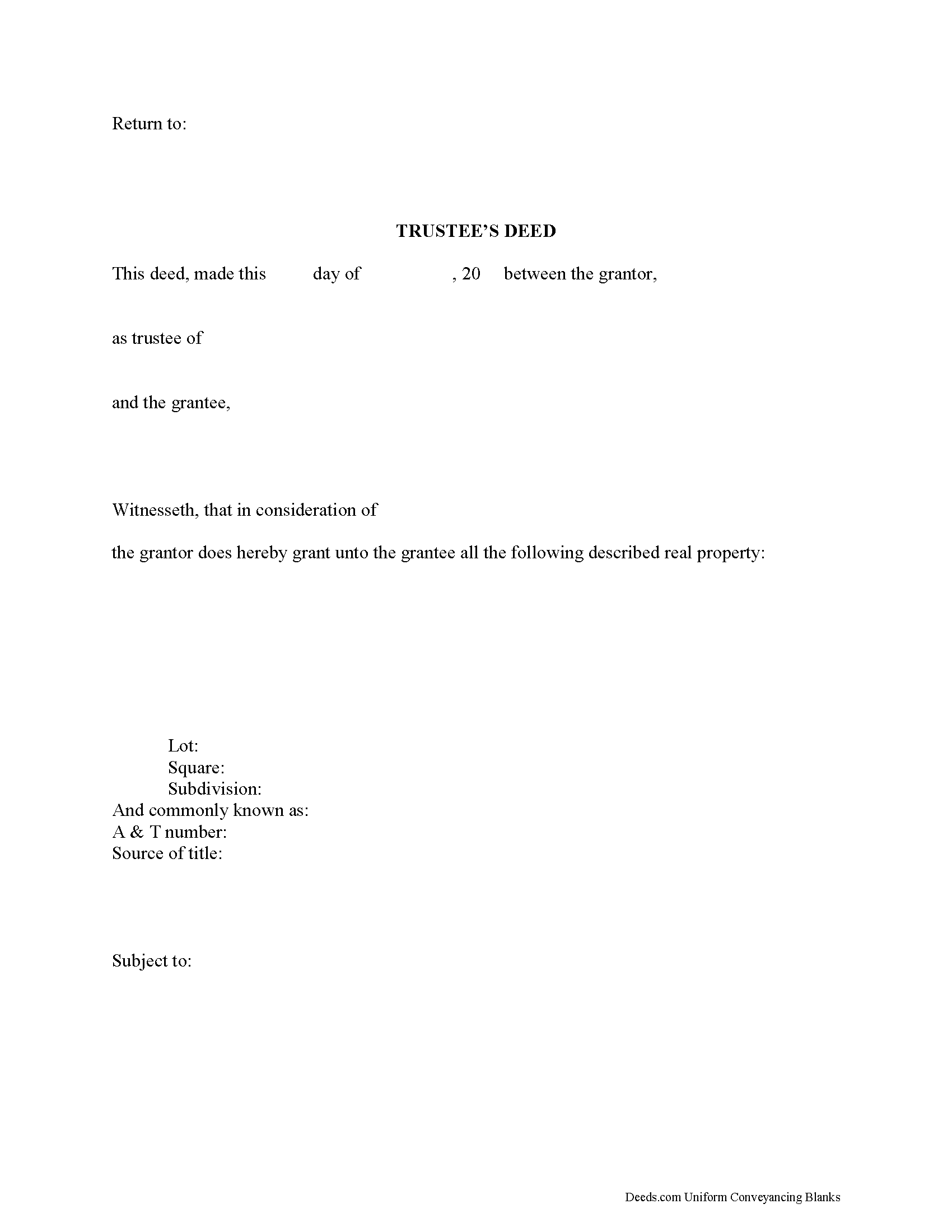
A trustee's deed is used in trust administration to convey real property out of a trust. The trustee's deed is named for the person executing the deed, rather than the type of deed it is. It is not to be confused with the statutory form of trustee's deed under a decree (D.C. Code 42:601), where the trustee is the assignee for foreclosure of a residential mortgage (D.C. Code 42:815.02(16)).
There are three main parties to a trust. The trust is first funded by the settlor, who contributes assets to the trust. The trust's terms are established by the settlor in the trust instrument, which is usually not recorded (D.C. Code 19:1301.03(16)). Within the trust instrument, the trustee is appointed as the trust's administrator, and title to real property is vested in the trustee's name as representative of the trust. A trust beneficiary is anyone having a present or future beneficial interest in the trust (D.C. Code 19:1301.03(2)). The trustee cannot also be the sole beneficiary (D.C. Code 19:1304.02(5)).
Under a power of sale established by the trust instrument, and under direction of the settlor, a trustee may convey trust property using the trustee's deed; the settlor is not n... More Information about the District Of Columbia Trustee Deed
Certificate of Trust
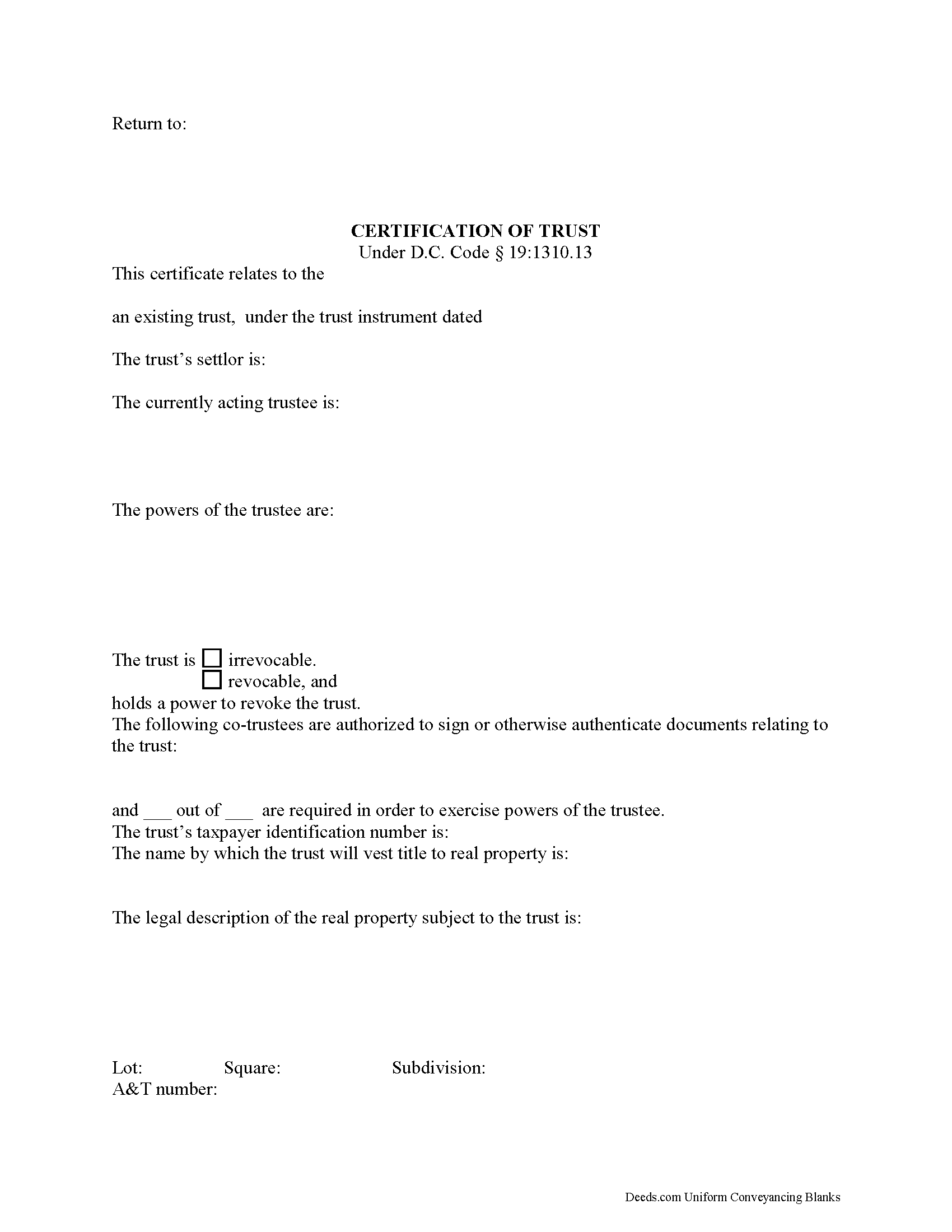
Trustees use a certification of trust in the place of furnishing a copy of the trust instrument to any party who does not have a beneficial interest in the trust. In Washington, D.C., the certification is governed by D.C. Code 19:1310.13.
The certification verifies the existence of the trust on behalf of which the trustee is acting and affirms the trustee's authority.
It presents only essential provisions of the trust instrument, such as the trust's name and date of establishment, the identity of the trust's settlor, the acting trustee's name and address, and the powers of the trustee relevant to the transaction for which the certificate is requested. The interests of any trust beneficiaries remain confidential.
In addition, the certification states whether the trust is irrevocable or revocable, and, if the latter, who holds the power to revoke the trust. If there are multiple trustees, the identity of each trustee who can sign documents relating to the trust is disclosed, as well as how many are required in order to exercise the power of the trustee.
Finally, the certification requires the trust's taxpayer identification number (either a SSN or an EIN, depending on t... More Information about the District Of Columbia Certificate of Trust
Lis Pendens
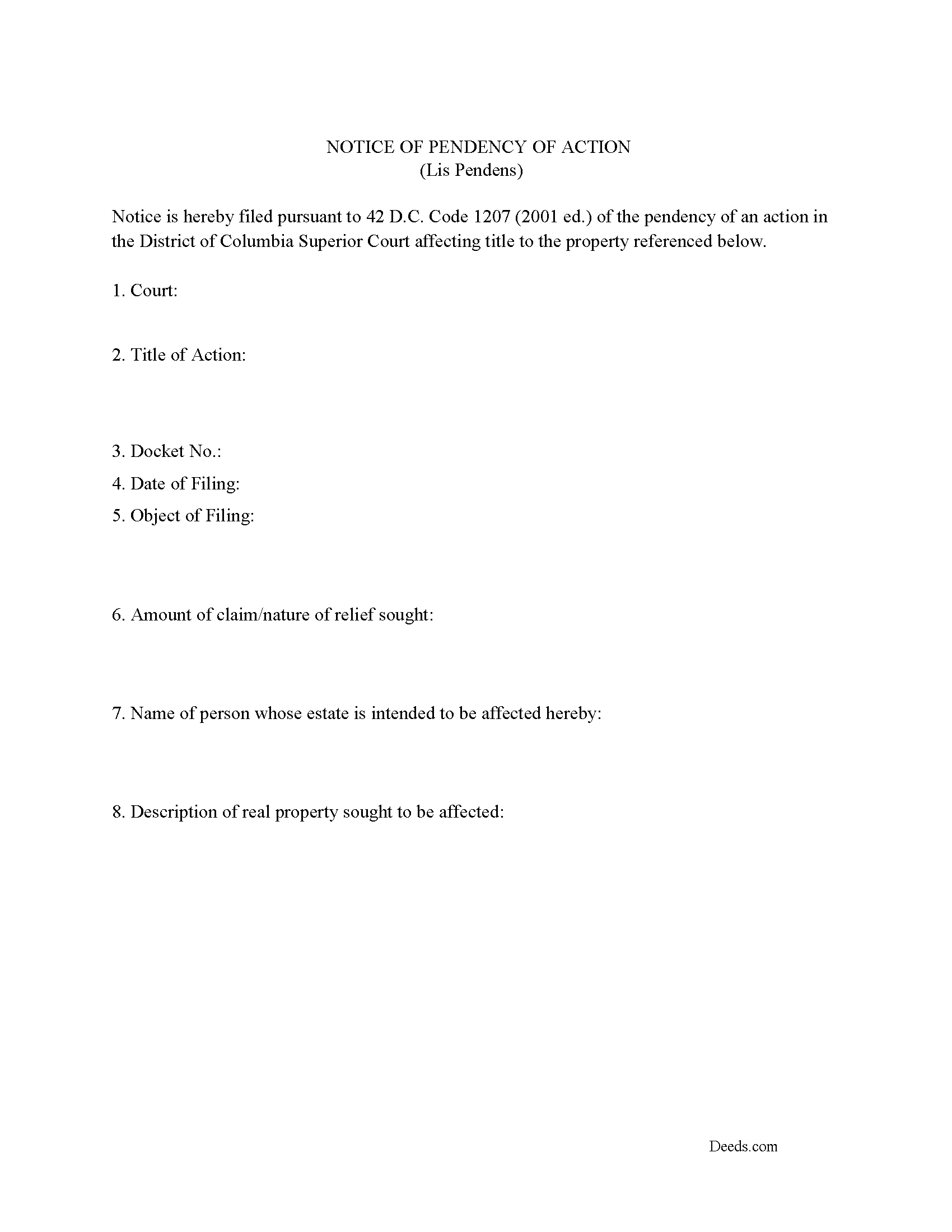
Notice of Pendency of Action (Lis Pendens) for the District of Columbia
Lis Pendens is Latin for "Pending Suit" A Lis Pendens is generally filed by the plaintiff. A Lis Pendens is a notice of litigation filed with the Recorder of Deeds to put third parties on constructive notice that a property interest is involved in pending litigation. Constructive notice means that people will be treated as if they had notice of the pending legal action. A Lis Pendens will show up in a title search, letting would be buyers know that there is pending litigation and if they purchase the property, they would be subject to the outcome of the litigation. In Washington, DC, lis pendens are governed by statute: DC 42-1207. In the District of Columbia a Lis Pendens must contain this information, ref 42--1207(b).
(1) Name of the court in which the action or proceeding has been filed;
(2) Title of the action or proceeding;
(3) Docket number;
(4) Date of filing;
(5) Object of the filing;
(6) Amount of the claim asserted or the nature of any other relief sought;
(7) Name of the person whose estate is intended to be affected thereby; and
(8) Description of the real property sough... More Information about the District Of Columbia Lis Pendens
Release of Notice of Lis Pendens
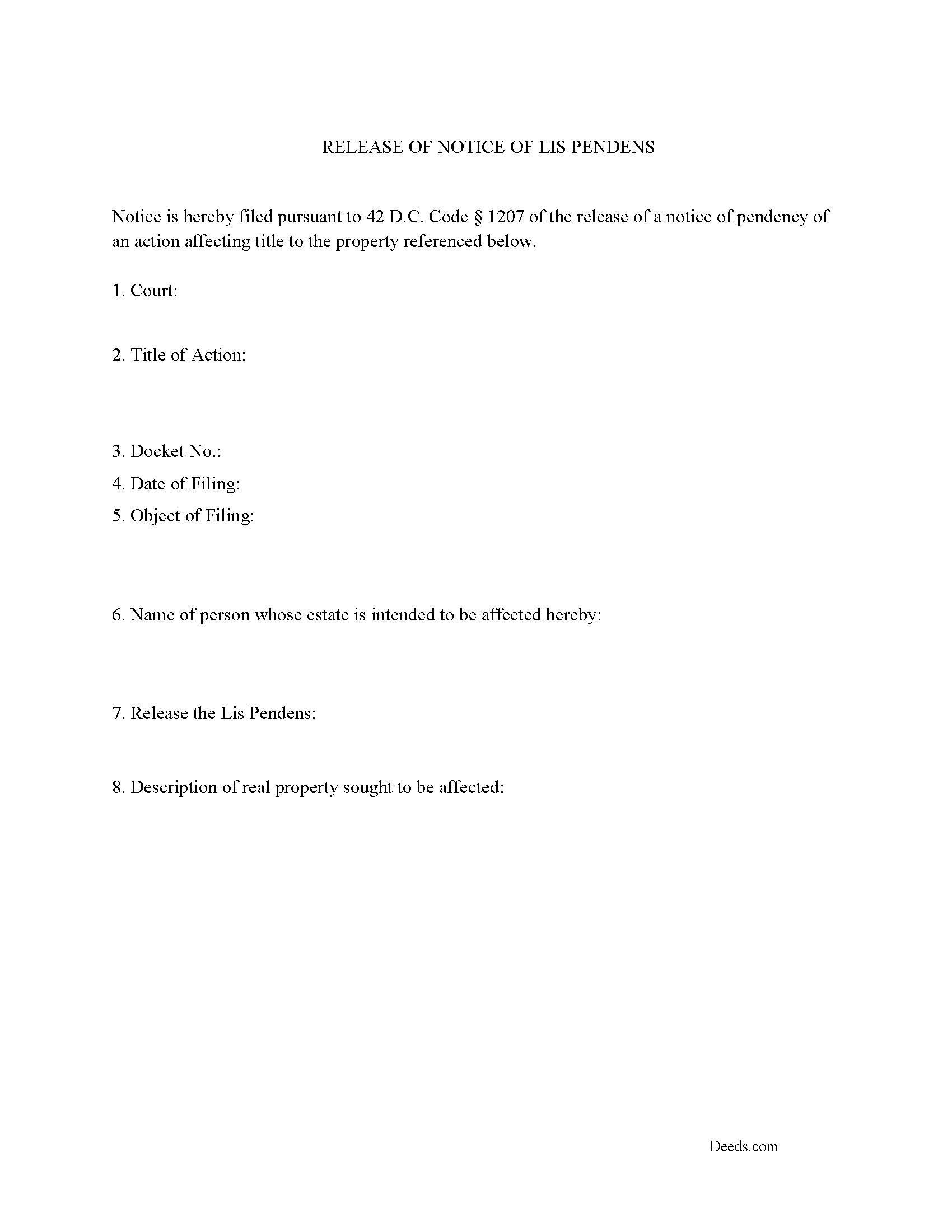
When a judgment goes against the party who filed the Notice of Lis Pendens it shall order the cancellation/release of said Lis Pendens, view 42--1207(d)(1) for complete details.
The party who filed the Lis Pendens Notice shall file the judgment ordering the cancellation and release of the Lis Pendens Notice with the Recorder of Deeds within 30 days, see 42--1207(d)(2) for complete details.
If a notice of the pendency of an action or proceeding is filed for recordation and the debt or other relief for which the action or proceeding was brought is satisfied, it shall be the duty of the party who filed the notice of pendency to file for recordation a release of the notice of pendency of the action or proceeding within 30 days after the satisfaction. 42--1207(e)
If the pending suit has been dismissed or terminated the party who filed the Notice of Lis Pendens shall file a Release of Lis Pendens within 30 days. View 42--1207(e)(1) for complete details.
District of Columbia statutes also apply fines for not releasing a Lis Pendens when required. In general, the party who filed the Notice of Pendency (Lis Pendens) should release the Lis Pendens when appropriate. Imagine a ... More Information about the District Of Columbia Release of Notice of Lis Pendens
Disclaimer of Interest
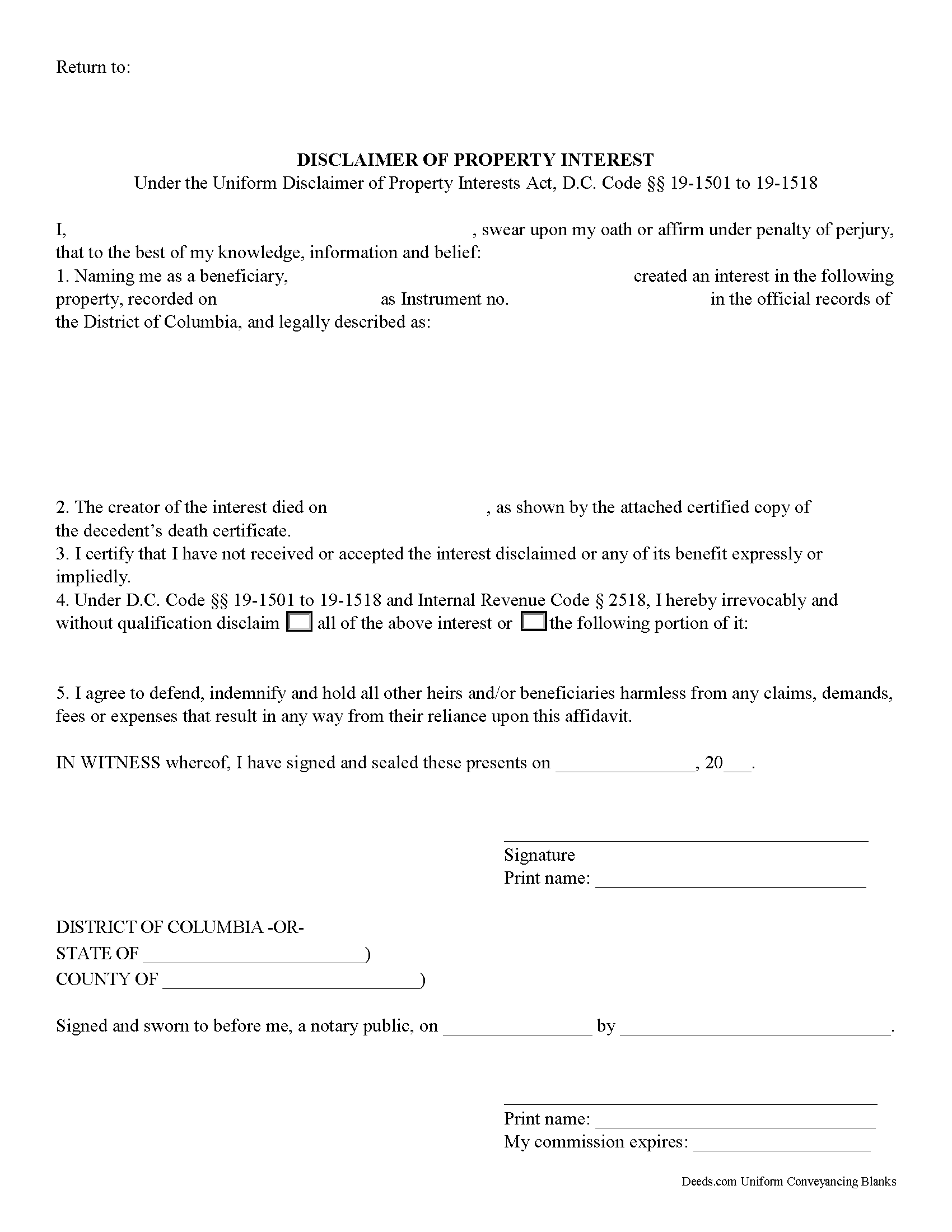
District of Columbia Disclaimer of Property Interest
Under the District of Columbia Code, the beneficiary of an interest in property may disclaim the gift, either in part or in full (D.C. Code 19-1501 to 19-1518 Uniform Disclaimer of Property Interests Act). Note that the option to disclaim is only available to beneficiaries who have not acted in any way to indicate acceptance or ownership of the interest ( 19-1513).
The document must be in writing and include a description of the interest, a declaration of intent to disclaim all or a defined portion of the interest, and be signed by the disclaimant ( 19-1505 (c)).
Deliver the disclaimer within nine months of the transfer (e.g., the death of the creator of the interest) to the personal representative of the decedent's estate or the trustee, or file it with the court having authority to appoint such a person or enforce the trust ( 19-1512 (c), (d)). If real property is involved, avoid any ambiguity regarding the chain of title by recording a copy of the document in the office of the DC recorder of deeds. See D.C. Code for details ( 19-1512 (g) and 19-1515).
A disclaimer is irrevocable and binding for the disclaiming... More Information about the District Of Columbia Disclaimer of Interest